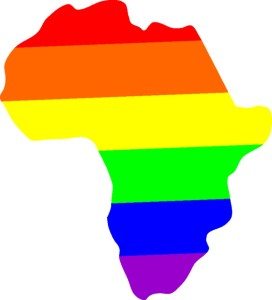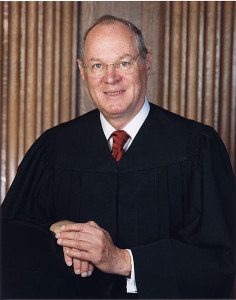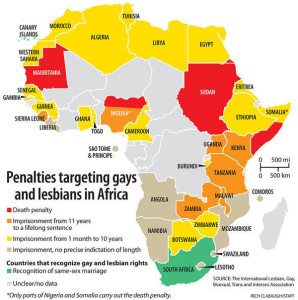Roopbaan! Bangladesh’s first and only LGBTI magazine! Roopbaan essentially translates into “A Fabulous Person”, and its time for Bangladesh’s LGBTI population to speak out about how fabulous they are and how fabulous their love is. The core theme is LOVE and the magazine is named after a famous Bengali folk character who symbolizes the power of love. A poignant choice as the power of love can conquer prejudice and oppression which many LGBTI people face in their daily lives to varying degrees of severity. The publication is aimed on the community level in the hope to expose love in all its glory and joy, and to ‘normalize’ LGBTI love in the area. It can be said the magazine itself is a labor of love as it involves the input from volunteer contributors, including articles, photography and personal accounts from members of the LGBTI community. [Read more…] about Roopbaan! The Right to Love!
gay rights
African Gay Rights Continue to Go Down

While Marriage Equality continues to spread over the United States of America and Europe like an unstoppable tidal wave, our African brothers and sisters are suffering a wave of anti-gay sentiment and anti-gay laws.
So why are African leaders getting away with laws that in some cases offer nothing but death as an option for being gay?
African politicians are referring to being gay as “learned” behaviors, and being gay as “disgusting” and a “genetic distortion”. The unfortunate effect of leaders using these sorts of negative descriptions for homosexuality is the uneducated populations willingly absorb these connotations and live by them as fact and absolute truth. So what is a peasant farmer in Uganda, who has no access to education, to believe. Would he question his political leaders as being right or wrong? Well the outcome here is the farmer more than likely will adopt the anti-gay rhetoric being publicized as normal by political leaders and more alarmingly spread this anti-gay sentiment and embed it in the minds of the next generation via his children and grandchildren.
The African education system is lacking also as a tool for equality, with teachers being the primary guilty party for truancy, and even if they were present full time would they teach equality in the state run classrooms? The short answer is no. Education for the most part is run by the same anti-gay politicians. So our new African generations will most likely not gain valuable equality information from school either.
So where do our new generations of Africans learn about the world, the struggle for equality and the future of societal change?
Cell phones – Africa’s cell phone use has risen to well over 650 million in recent years and is being used for many outreach activities, more noticeably and successfully as a mobile banking system (M-PESA) for the many Africans who have no where to store money or the ability to enact transactions to buy food, materials for survival. These cell phones can access Twitter, Facebook, the internet at large and as we have seen in global development, the information age has spread the societal movement and development faster than ever before. Campaigns spread around the world at incredible speeds and gain support like a typhoon, most memorable was the campaign “Kony 2012”, however ill-fated as it was we are unable to deny the incredible level of support this campaign generated in such a small space of time.
Perhaps Africa will also generate its own whirlwind of online campaigning and support in time via gay equality movements from the local civil society of Africa, and we outsiders to Africa must support, hit our like buttons, comment and create a deafening call of support that African leaders are unable to ignore, so our brothers and sisters in Africa are encouraged to continue fighting for their equal and human rights to love, be free and be who they are open and proud.
The picture below illustrates the current state of anti-gay laws on the African continent.
Gay Rights in America: What will the Outcome be?
With the unofficial start of summer having come and gone, June is quickly approaching. For those fighting in favor of gay rights a great and ominous question is now beginning to ruminate: What will be the Supreme Court’s rulings for the United States v. Windsor and Hollingsworth v. Perry cases argued at the end of March?

Opinions are varied. Many will argue that the time of justice for the LGBT community is here. The United States cannot afford to further delay the institution of equality among varied sexual identities. By contrast, many have said the event of great change is well ahead of its time. While public opinion appears to suggest that America is leaning towards a more modern understanding of homosexuality, bisexuality, asexuality and gender identity, therein remains the argument of morality. Morality, though relative, often wins, which suggests that while America is listening more, they don’t yet wholly accept it.
In New York, there has been a significant rise in crimes against the gay community – especially involving violent crimes against gay men. Several openly gay men, including activists and well-known members of the community, have been taunted with callous gay slurs and in some cases beaten, leaving them hospital-bound. In one case on May 17th a young man was in fact killed after being taunted by hate-mongering bullies for being gay. The word of homicide quickly spread through the community and put everyone on very high alert.
This rise in crime has been said to be a psychological backlash against the growing support for gay rights, including gay marriage. Twelve states have officially recognized gay marriage as legitimate and fully legal, including New York itself. This spread of success for the gay community has left those in its opposition with a sense of failure and fear that they are losing the battle. It can be said that fear breeds anger and hate, which is what we are seeing more prominently with every equal rights milestone.

The Supreme Court’s official rulings for United States v. Windsor, which includes the upholding or the dismissal of DOMA, and Hollingsworth v. Perry, which includes the upholding or dismissal of California’s Proposition 8, are both expected at the end of June this year. What is to be expected?

Many experts say it could be a tight ruling. The liberal and conservative extremes among the collective justices do not seem to necessarily be playing a major role in the direction with which they lean. Many conservatives have been outspoken in favor of gay rights, while many liberals have argued against it. It has been implied as of recent that the swing vote could be Justice Anthony Kennedy. Justice Kennedy has been the swing vote for several cases in the recent past. Since the initial hearing in March, three U.S. states and three countries, including France, have passed gay marriage. It is certainly realistic that these landmark events have influenced Justice Kennedy, as well as others, in favor of striking down DOMA and Proposition 8 this June.




